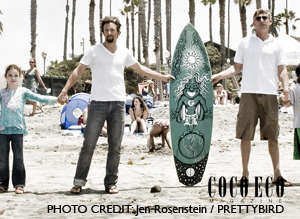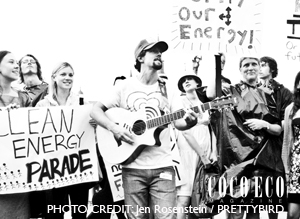
Written by Magda Rod and Anna Griffin
Images by Jen Rosenstein/PRETTYBIRD

As the world watched the destruction of The Gulf of Mexico caused by the BP oil spill, some passionate activists stepped up to lend their voice to the potential solutions to the crisis. One such hero was Jason Mraz. I was honored to join Jason and the FUEL team in New Orleans in June, as we gathered with heads of environmental NGOs and others to brainstorm and give a voice to the solutions.
FUEL director Josh Tickell stated:
The FUEL events in New Orleans were designed to focus attention on solutions to the oil spill. The first public theatrical FUEL screening with a community Q&A, the think tank, the March and the aerial photo were all part of the same message. I think Jason said the message best in his song as he led the massive crowd around Jackson Square. His words, 'All We are Saying is Give Green a Chance', were echoed by an enthusiastic crowd. For everyone there, he made the moment vividly inspiring. I think its something that the people who showed up that rainy Tuesday will never forget.
Coco Eco Mag: Congratulations on your two Grammy's. I noticed your Dad celebrating with you that night, and he said that of course he was proud of you, but already was and would be with or without the Grammy's. It sounds like you have a pretty solid foundation you're building on.
Jason Mraz: Indeed. My parents were always very supportive and accepting. They even shared my curiosity for life, or perhaps I theirs.
CEM: Rumor has it that you're a "walk the talk" kind of guy. What sort of sustainable practices do you live in your every day life? Are you off the grid, etc? I hear avocados are involved in some way. What's the story?
JM: I'm not off the grid yet, but that is the goal. At the moment we only have a solar system to offset the electricity our house and studio use. We're currently exploring energy storage and where to dig our well as we're gearing up to source as much of our own water as possible. With such little rainfall and rising water prices in San Diego, catching rain and storing it is the way to go. This year we're also launching a three-year transformation from our mono-culture of non-organic avocados, to a more diversified property of organic foods. The goal is to generate 365 days of food with a surplus for our friends and neighbors.
CEM: That's inspiring! I'm glad you brought up water. I was so pleased to see you in New Orleans, participating in the FUEL events to draw attention to the crisis in The Gulf. What prompted you to support this?
JM: I was dumbfounded by the lack of clean-up and the way BP was going about cleaning up the spill using toxic dispersants. Why hasn't this been declared a national emergency? I was curious as to why a million Americans weren't lining the beaches in boats and with buckets to preserve the life sustaining resource that is the Gulf of Mexico. Personally, as a surfer, I was most sorry for my fellow watermen. Seeing beaches closed due to contamination just broke my heart. If that ever happened in San Diego I'm afraid I might be forced to move.
So I took action. I raised my hand to volunteer my time and to see what the heck was the hold up in stopping the spill and what was slowing the clean-up. What I discovered was a cluster f*** between BP, local authorities, fisherman, coast guard, and government policy. No one wants to be liable in case more goes wrong. Add this to the growing size of the spill and you get the sense that its almost impossible for anyone to contribute. Beaches are off limits and locals are for the continuation of drilling. The conversation down south seems to be getting mixed reviews. Learning this, I want to see a win/win for all. I believe all people are good at heart, it's just that our limited knowledge and resources, or lack of transparency I should say, make it hard to navigate through this much needed shift.
My involvement will be a push for a faster clean-up solution and a future in clean energy, to bring awareness about the technologies than can reduce our dependency on Oil. With greener cars and appliances, greener ways to heat and cool our homes, companies like BP won't have to work so hard to meet our demand for Oil. With less of an appetite for oil, perhaps we can save the arctic from disaster and even go as far as leaving Iraq alone or spend our time helping them rebuild their country instead.
CEM: What was the result of your effort with the think tank and other connections you worked with there?
JM: We created an Oil Clean Up Alliance, where any one person and all organizations can share resources and info to take immediate action. My personal result is the commitment to communicate through all my channels a push of the green movement even harder and take full responsibility for this spill.

CEM: Did you get a chance to personally see any of the damage while you were there?
JM: I did. I visited Grande Isle Louisiana where the oil is showing up on the beach. It's ground zero of the disaster and where depending on the day, 30-60% of US oil is piped from. On the closed beaches, oil is being bulldozed and packed down into the sand -- even behind the booms laid out to stop oil from coming up on land. It's not easy to see at first. I made-up on my head that the clean up is more like a cover up. The same applies for the surface oil. The products BP are using are only sinking the oil. Little do they seem to care about the horrible effects this will continue to have on the natural world as the currents underwater will carry these huge clouds of oil to every corner of the globe while the toxic dispersants themselves pollute the water and kill the wild and marine life. Few were on the wasteland of the beach but us, a group of seven environmentalists and then a sad image of a mom and two young daughters playing in the sand. This was their vacation beach and they weren't allowed to go near the water. We were all being watched by three men on a distant deck with binoculars. Maybe they were locals or curious like us, I'll never know. Either way, it was a creepy scene.
The other damage we saw were all the closed restaurants and road signage by the community such as, "if we're not allowed to fish or swim, how are we supposed to feed our children?"
CEM: That's heartbreaking. What's the hardest part about this disaster for you personally?
JM: The most difficult part of this story is meeting the families who are being devastated by this disaster. Even if there was food to catch, fisherman don't want to run their boats through the oil. It isn't pretty out there. And for those who support the Oil business, it's that which they support that has reeked havoc on their natural environment and caused a great deal of death and disease in their community. They feel if the oil companies pack up and leave, which they could, then hundreds of thousands would be out of work, collapsing their entire economy. This is a worthy fear when that's all that's available in the area. A push for new technologies and new energy sources to operate in that region could keep them all in business as well as a lot safer.
CEM: Right. If we could replace the drilling with clean energy production, it would be a win/win for all involved. So what do you think people can do to help "turn the tide" so to speak?
JM: Step 1. Call your Senators. Be in their face as much as the oil companies are. Insist they vote for green and clean energy; otherwise, tell them you will vote for someone else.
Step 2. Take your own personal steps to reduce energy consumption and unnecessary waste, especially with fuel and single-use plastics! Each American has to have their own eureka moment for this green shift to happen and sustain itself. Its now or never and we need everyone awake on this issue. The next 1000 years will be determined by how hard we work right now!
CEM: Has the disaster influenced your creative process in any way? Writing any songs about the issue?
JM: Everything in life influences my music. I've always used songwriting as a means to share what I think is profound. Music is a weapon in the war against unhappiness.

CEM: I hear you are launching a PSA campaign about environmental awareness Can you tell me more about that? And it involves children, right?
JM: We plan to launch a viral awareness campaign. This is an important election year in that we need to elect only those who are environmentally conscious, otherwise, the world as we know it will look like and smell like the closed and contaminated beaches of the Gulf. We've tried the old paradigm and in my opinion, the war and the oil spill have gone on for too long. We made change possible when we elected Obama and so we must do it again and create a government that supports the beautiful green future. And yes, we want children involved in this asking powerful questions of our leaders as it is the children's world we're presently mucking up.
CEM: What a great idea. What's coming up next for you in the music arena? A record? Tour?
JM: All of the above. Much music has been recorded this year and we plan to circumnavigate the globe in '11 and '12 to shine a little light to all moths seeking a flame.
CEM: How do you green your touring process and do you find it challenging to maintain your lifestyle when you're on the road?
JM: We seek out locations where BioDeisel is available, only choose green hotels, and we do not allow plastic water bottles. We eat locally and travel light, hoping to stimulate each local economy fairly and leave no trace of our being there other than seeing smiles on peoples faces.
CEM: Does your eco-activism influence your fans? What are some of the ways they are impacted?
JM: My partner and I received a Twitter message from a fan that says it all. They posted, "SO inspired by @tprettyman and @jason_mraz. I ask forgiveness for my addiction to oil. I am committed to changing the way I live.
CEM: Right on. Inspiring and educating people, and leading by example are powerful tools for transformation. Any ideas for how the music industry could green up its act?
JM: Musicians are so well covered in the press, it would be great to see more outspoken practitioners of green life.
Also, the touring world could stand a make-over. We use so much fuel and electricity to put on concerts that it would be a lot sexier to travel with solar generators and truck and bus convoys that run on Algae fuel.
CEM: Amen to that! So speaking of sexy, what clothes do you like wearing? Are there any particular brands you love?
JM: I'm not a brand whore. I've always been a jeans and t-shirt kind of guy. These days I prefer organic fibers because they feel better on my skin. Recently I co-founded BlendApparel.com, a green t-shirt company with transformative messages, that we hope keep our conversation going about our ever changing environment -- Tees intended to inspire and empower the people, etc.
CEM: And organic feels not only good on the skin, but on the planet too. If everyone shifted to organic vs. conventional cotton, we could dramatically reduce the amount of poison being pumped into our planet. And those bamboo T's are super yummy. According to the Blend Apparel website, are made by "transformationaries." Loving that term!
Thanks so much for your time Jason, and all you are doing to raise awareness and doing your part to help "Turn the Tide."
It's somewhat of a consolation to me to know that there are people like Jason out there actively working on getting the word out about the magnitude of the problems we face, and better yet, the potential solutions to them. There are others in the public eye who are speaking out as well. Philippe Cousteau pointed out recently that our government spends infinitely more on space exploration than on studying and protecting our world's oceans.
James Cameron, a man who has spent over 3,000 hours in our oceans and recognizes their magnificence and how essential their health is to our entire ecosystem, has confirmed that the sequel to Avatar will be focused on the oceans of Pandora. Hopefully that will lead to more discussion about this vital issue. But then again, that film could take five years to make, and the time for action is now.
It's time for us all to stand up and speak up. What are you going to do to be part of the solution?**